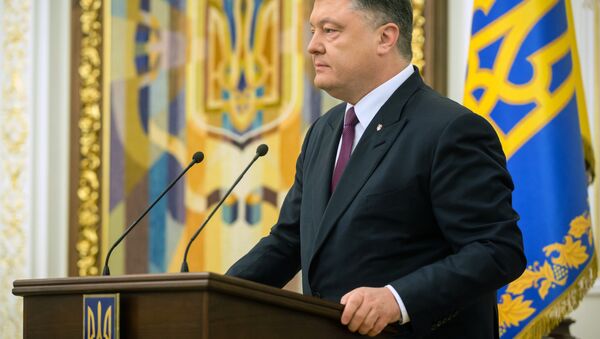Under the new rules, activists and journalists working with independent organizations involved in anti-corruption work must publicly declare personal assets, even if they do not receive public funding. Those who fail to file asset declarations face criminal charges and up to two years in prison. Human Rights Watch (HRW) has called on President Petro Poroshenko to annul the new measure, calling it an "unjustified interference" with freedom of expression and other rights.
"This new requirement is a slap in the face for Ukraine's anti-corruption activists and their international partners who have been calling for a more transparent government. The requirement conflates state officials, who have a responsibility to divulge their assets because they enjoy certain privileges of office and their work is funded by taxpayers, with private citizens who report on issues of public interest," explained Tanya Cooper, Ukraine researcher at Human Rights Watch.
Ukraine: New Law Targets Anti-Corruption Activists, Journalists https://t.co/6Zi6X3ahI4
— Human Rights Watch (@hrw) April 5, 2017
This law is a setback for rights in #Ukraine; hope govt reconsiders & Kyiv's allies raise concern @hrw @EUOSCE @GermanyDiplo @NeilRBuckley https://t.co/AKG7NwXUdo
— Hugh Williamson (@HughAWilliamson) April 5, 2017
Following the Maidan coup, Ukraine's new political leadership pledged ambitious anti-corruption reforms to create a more transparent government. One key reform enacted since requires Ukraine's state officials to publicly declare their assets annually through an online filing system, one of the major requirements imposed on the government by the European Union in return for visa-free EU/Ukraine travel.
Having just signed law attacking #Ukraine's anti-corruption NGOs, Pres @Poroshenko at #KSF demands visa-free regime & Marshall plan from EU😬
— Andreas Umland (@UmlandAndreas) April 6, 2017
Press release: Parliament approves #Ukraine visa waiver:https://t.co/guHVLn8p87
— EP PressService (@EuroParlPress) April 6, 2017
Many political figures, including the EU Commissioner for European Neighborhoods Policy and Enlargement Negotiations and the UK Ambassador to Ukraine took to Twitter to voice their condemnation of the measures.
HRW further said the amendments were incompatible with respect for human rights, such as freedom of expression and the right to privacy, protected by international treaties to which Ukraine is party, as well as the country's own constitution.
For example, Ukraine is party to both the European Convention on Human Rights and International Covenant on Civil and Political Rights, both of which require any state and all interference with either freedom of expression or right to privacy to have a legitimate aim and to be necessary and proportionate to achieve that aim.
2. Members of civil society play vital role for transparency; targeting them is a step backwards.
— U.S. Embassy Kyiv (@USEmbassyKyiv) March 23, 2017
In such cases, HRW stated, laws that by design or otherwise have a chilling effect on civil society and media reporting on abuse of state power and public office are not a justified interference with freedom of expression standards under international law.
Restrictions that prevent such scrutiny are in not compatible with freedom of expressions standards — and even if the interference into the personal finances of journalists and activists had a legitimate aim, to base that interference simply on the work they do is not justified as either necessary or proportionate, HRW claim.
Ukraine's failure to effectively deal with corruption in the wake of the Maidan coup has been documented by numerous observers.
In Transparency International's 2016 Corruption Perception Index, the country scored 29 points out a possible 100 — admittedly, a mild improvement on 2015's score (31), but still a rating that classes it amongst the world's most corrupt.
In international rankings, it stands at 131 out of the 176 countries considered by the study.
Corruption Perceptions Index 2016 https://t.co/Fsdmntmp1J
— Danna NP (@dannamnieto) March 24, 2017
Commenting, Yaroslav Yurchyshyn, Executive Director of Transparency International Ukraine, said the country was blighted by official impunity and an inadequate justice system.
"The de facto immunity of corrupt officials prevents reform. Without the complete cleansing of the justice system and a transparent and fair judicial system we will not be able to break the impunity circle," Yurchyshyn said.
The EU has also, both publicly and privately, voiced its frustrations at Ukraine's woeful progress.
Former Polish Prime Minister Leszek Miller previously told Sputnik the EU was growing increasingly impatient, and the visa-free regime could well be abolished. In December 2016, the European Court of Auditors said the country's rife corruption weighed heavily on its international support.
"Despite reform efforts, Ukraine is still perceived as the most corrupt country in Europe. Vested interests influence public policy-making. Oligarchic clans continue to exert a dominant influence on Ukraine's economy, politics and media," the ECA report concluded.


